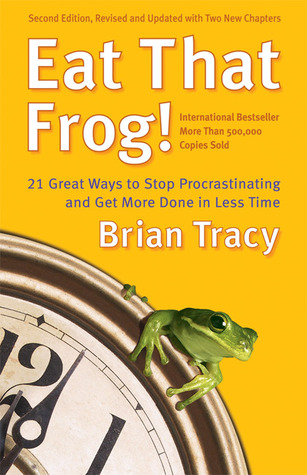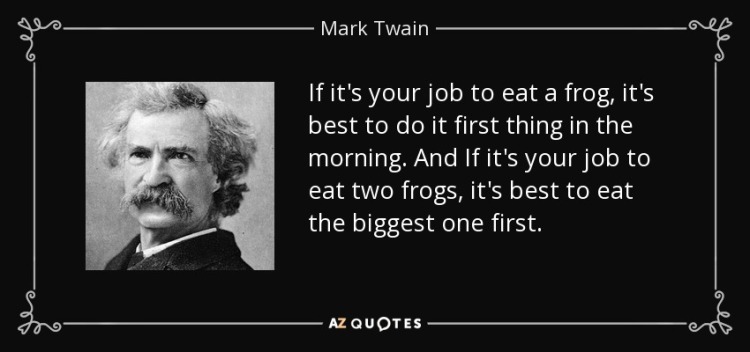
Ironically, I recently finished reading Eat That Frog by Brian Tracy, a book all about how to be the most productive, efficient, and, ideally, highly rewarded employee you can be, with less than 20 days left at my current job.
Tracy gets the title of his book from a quote attributed to Mark Twain:

I found this book chock full of practical, actionable advice. With one caveat… you FIRST have to CLEARLY decide on your priorities, your FROG. I think I am really good at getting things done. Ask my husband, I am a motivator and activator around the house. The trouble is, in a work environment I have trouble figuring out WHAT FROG to eat. It’s not that I procrastinate, per se, but rather that I just don’t know what is most important to me when it comes to my professional work.
Without further ado… here are the 21 ways to stop procrastinating. Follow these 21 steps, practice them regularly, and when they become firmly ingrained in and second nature to you, Brian Tracy claims that “your future will be guaranteed!” Whoa! Bold Claim.
- Set the table-– Decide exactly what you want. Clarity is key. Write out your goals and objectives before you begin.
- Plan every day in advance— Think on paper. Every minute you spend planning can save you 5 or 10 minutes in execution.
- Apply the 80-20 rule to everything-– Remember that 20% of your activities account for 80% of your results. Always concentrate your efforts on that top 20%
- Consider the consequences-– Your most important tasks are those that can have the more serious and impactful consequences on your life and work. Focus on these above all.
- Practice A, B, C, D, E method continuously— Before you begin work on tasks, take a minute to organize them by value and priority so that you can be sure to work on most valuable task first and maybe only.
- Focus on key result areas— Identify those results that you absolutely positively have to get to do your job well and work on them all day long.
- Practice the law of forced efficiency-– It says there’s never enough time to do everything but there’s always enough time to do the most important things. What are they?
- Prepare thoroughly before you begin— 6Ps → Proper Planning and Preparation(I’d say practice) Prevents Poor Performance
- Upgrade your skills— The more knowledgeable and skilled you become at your key tasks, the faster you start them and the sooner you get them done.
- Leverage your special talents— Determine exactly what you are very good at doing, or could be good at, and throw your whole heart into doing those specific things very well.
- Identify your key constraints— Determine the bottleneck or choke points, internally or externally, that set the speed at which you achieve your most important goals and focus on alleviating them.
- Take it one oil barrel at a time— You can complete the biggest and most complicated job if you just complete it one step at a time.
- Put the pressure on yourself— Imagine you have to leave town for a month and work as if you have to get all your major tasks completed before you left.
- Maximize your personal powers— Identify your periods of highest physical and mental energy each day and structure your most important and demanding tasks around these times. Get lots of rest so you can perform at your best.
- Motivate yourself into action— Be your own cheerleader. Focus on the solution rather than the problem. Always be optimistic and constructive.
- Practice creative procrastination— Since you can’t do everything you must deliberately learn to put off the tasks that are low value so that you have enough time to do the few tasks that really count.
- Do the most difficult task first-– Begin each day with your most difficult task. The one task that can make the greatest contribution to yourself and your work and resolve to stay at it until it’s complete.
- Slice and dice the task— Break large, complex tasks into bite-sized pieces and do just one small part of the task to get started.
- Create large chunks of time— Organize your days around large chunks of time where you can concentrate for extended time on your most important tasks.
- Develop a sense of urgency— Make it a habit of moving fast on your key tasks. Become known as a person who does things quickly and well.
- Single-handle every task— Set clear priorities. Start immediately on your most important task and then work without stopping until the job is 100% complete.
Since I’ve already established my trouble deciding on which frog to eat, I appreciate all the practical advice about zeroing in on and eliminating the frogs that are not a good use of your time or talents.
Something to keep in mind about these frogs you don’t want to eat:
“One of the very worst uses of time is to do something very well that need not be done at all.”
It may seem counterintuitive, but it will actually maximize my time if I prioritize time to establish a “what-not-to-do” list:
“You can get your time and your life under control only to the degree to which you discontinue your lower-value activities.”
There’s only so much time in each day, week, month, year. I need to be discerning about how I spend it:
“Your ability to choose between the important and the unimportant is the key determinant of your success in life and work.”
These quotes also remind me of 3 other similar concepts from 3 other authors:
- The “hedgehog concept” from Good to Great by Jim Collins
- Zen Habits by Leo Babauta
- Essentialism by Greg McKeown
Of all the salient ideas and quotes from this book– and I do think there are numerous that deserve attention and thought– this is the guiding “why” for me. Why does any of this matter? Why am I spending time reading and thinking about time management and work priorities?
This is why:
“Rule: It is the quality of time at work that counts and the quantity of time at home that matters.”
Maybe, at least for now, my home work is my life’s most important work. Time to prioritize that frog and eat it first thing every day!